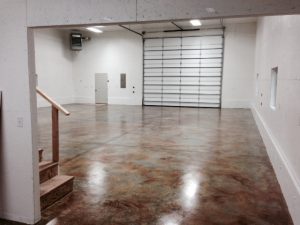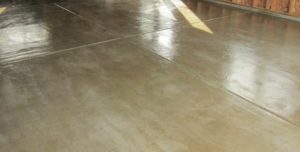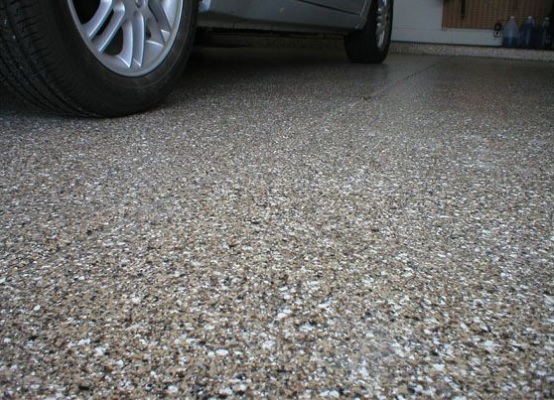The three best garage floor coatings are acrylic sealers, epoxy coatings, and urethane coatings. Each type of coating offers its own set of strengths and weaknesses.
Best Acrylic Garage Floor Coatings
Acrylic concrete sealers are very popular garage floor coatings. They can be applied directly to the concrete without first having to acid etch or grind the surface. There are many benefits to applying an acrylic concrete sealer, including:
- Acrylic garage floor coatings can be applied to concrete without having to etch or
 grind the surface.
grind the surface. - Acrylic garage floor coatings are available in clear or color options.
- Acrylic garage floor coatings are very easy to repair, maintain, and recoat.
- Acrylic garage floor coatings offer resistance to water, oil, and hot tire pickkup.
- Acrylic garage floor coatings can provide years of life before the need for a recoat.
- Solvent based acrylics can darken the concrete to give it a similar appearance to being wet.
Acrylic concrete sealers, although very strong, have their limitations. Acrylic concrete coatings can withstand exposure to harsh liquids, such as oil, but long term exposure will cause the acrylic to soften. The concrete will remain protected against staining, but the acrylic will take the abuse and need to be repaired. Acrylic sealers are not good to use on repair shop floors, or garage floors where oil spills are a daily occurrence. Acrylic sealers are however a great coating option for residential garage floors.
Acrylic Concrete Sealer Reviews:
- Eagle High Gloss Sealer (average 4.6 star review)
- Armor AR350 Wet Look Sealer (average 4.8 star review)
- Armor AR500 High Gloss Sealer (average 4.9 star review)
- Enduraseal SB Acrylic Sealer (average 4.5 star review)
Best Epoxy Garage Floor Coatings
Epoxy concrete coatings are a very popular garage floor coating. They are used as a complete garage coating system, as well as the primer coat to urethane coating systems. There are many benefits to applying an epoxy coating, including:
- Epoxy garage floor coatings bond aggressively to the concrete.

- Epoxy garage floor coatings will reduce moisture in the slab.
- Epoxy garage floor coatings will offer resistance to to oil and chemical spills on the surface.
- Epoxy garage floor coatings are resistant to hot tire pickup.
- Epoxy garage floor coatings are long lasting garage floor coatings.
Epoxy garage floor coatings need to be applied to concrete that has been acid etched. If an epoxy garage floor coating is applied to smooth trowel concrete that has not been etched, the coating can delaminate and peel up from the concrete.
One major downfall to epoxy coatings is that they are not UV resistant. Overtime the epoxy garage floor coating will yellow from exposure to UV rays. Epoxy coatings offer some resistance to oil and chemicals, but long term exposure will cause the epoxy to breakdown.
Epoxy Concrete Coating Reviews:
- Armor Epoxy Coating: Water based 2-part epoxy primer and top coat in one. Will reduce moisture in concrete, and protect the concrete surface against staining and deterioration caused by surface abrasion. A higher solids version is available for consumers that need more moisture protection, or want to apply the epoxy in a color.
- Sherwin Williams Epoxy Coating: Ready to apply residential grade epoxy coating for concrete floors.
- Rust-Oleum Epoxy Coating: Ready to apply residential grade epoxy coating for concrete floors.
- Laticrete Epoxy: 2 part epoxy primer and top coat in one. Will reduce moisture in concrete and protect the concrete surface against staining and deterioration.
Best Urethane Garage Floor Coatings
Urethane garage floor coatings are the strongest type of floor coating on the market. Certain urethane coatings, like the Armor UTN60, are resistant to oil, gas, and chemical spills. They will withstand surface abrasion, vehicle and foot traffic, hot tire pickup, and more. They are very strong coatings designed to last for at least ten or more years.
The only downfall to a urethane garage floor coatings is that the concrete needs to be ground to a 40-80 grit finish before applying. If the floor is not properly prepared, the coating can delaminate.
Urethane coatings are applied in clear and color options, as well as part of a chip system. Chip systems are becoming an increasingly popular way to both enhance and protect a garage floor.
Colored and Tinted Garage Floor Coatings
If you don’t like the look of gray concrete, there are several ways in which you can color it:
- You can acid stain the concrete floor before applying a clear coating. Acrylic sealers are great coatings to apply over acid stained concrete. Epoxy and urethane coatings are also good options. Acid staining concrete will give the garage floor a marble-like finish.
- You can color an acrylic sealer, epoxy coating (some, not all), or urethane coating to give a solid, high gloss colored finish to your garage floor.
- You can color your epoxy or urethane coating and add polycast or acrylic chips to give the garage floor a nice variance in color and depth. See the video below.
Garage Floor Coating Comparisons
The following comparison chart shows how each type of concrete coating differs from the next.
| Acrylic Sealer | Epoxy Coating | Urethane Coating |
| No surface prep required | Must acid etch surfce | Must grind the surface |
| Lasts 5+ years | Lasts 7+ years | Lasts 10+ years |
| Easy recoat | Screen sanding to recoat | Screen sanding to recoat |
| Repells water and other liquids | Repells water and other liquids | Repells water and other liquids |
| Oil will soften coating | Resists short term exposure to oil | Resists long term exposure to oil |
| Chemicals will soften coating | Resists short term exposure to chemicals | Resists long term exposure to chemicals |
Still not sure which garage floor coating is best for your garage floor? Consider these questions:
- Do you plan on acid etching or grinding the surface of the concrete before applying a concrete coating? If no, then you want an acrylic sealer. If yes, then you want an epoxy coating if you are planning on etching the floor, or an epoxy or a urethane coating if you are planning on grinding the floor.
- Do you constantly spill oil or chemicals onto the surface of the concrete? If yes, then you want an epoxy coating or a urethane coating depending on how often oil and chemicals are spilled onto the surface.
- Do you have issues with high moisture? If yes, then you want an epoxy coating or a urethane coating.
Combining Coatings:
It is not uncommon to combine coatings. In fact, many urethane coatings will use an epoxy coating as a primer. Epoxy coatings offer an aggressive bond to concrete, and they help to reduce moisture. When you combine an epoxy with a urethane you get the benefits of each type of coating.
Garage Floor Paint
Garage floor paint is a thing of the past. It used to be a popular option for coating floors, but is quickly being replaced by better alternatives, such as acrylic and epoxy coatings. There are many problems with garage floor paint, including:
- Garage floor paint does not bond to the concrete. Instead, it sticks to the concrete.
- Garage floor paint will peel, chip, and flake.
- Garage floor paint doesn’t recoat nicely. In fact, when you recoat paint you can see the impurities of the original coat below.
- Garage floor paint doesn’t protect the concrete against oil, gas, or chemicals.
- Garage floor paint doesn’t offer a nice, long lasting gloss finish.
- Garage floor paint can’t be maintained and often has to be removed every 2-5 years.
The most common type of garage floor paints are acrylic latex sealers and epoxy paint. Acrylic latex sealers differ greatly from acrylic sealers, and epoxy paint differs greatly from an epoxy coating. If the title or description includes “latex” or “paint”, avoid purchasing unless you want to invest time and money into the removal of these types of products down the road. If you want something that is easy to apply and long lasting, consider instead an acrylic sealer.

